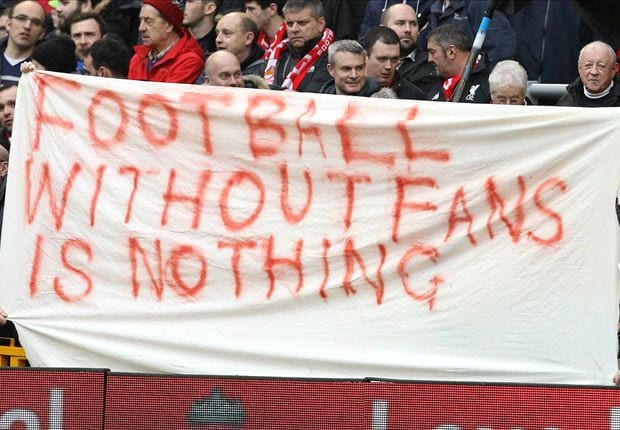“We’re sorry” read the back page of Metro last week. The grovelling apology resulted from the proposed hike in ticket prices announced by Liverpool FC.
The furore surfaced when Fenway Sports Group (FSG) – Liverpool’s owners – revealed highly controversial plans for a £77 matchday ticket in the redeveloped main stand and season tickets of £1,029, a significant increase on the current £59 and £869 prices.
Quite rightly fans were furious and 10,000 of them, including one Jamie Carragher, walked out of Anfield 77 minutes into Liverpool’s game against Sunderland. Immediately Liverpool’s 2-0 lead evaporated and a lowly Sunderland secured a valuable point with two late goals. All because of the walk out? Who knows?
But it’s not just Liverpool fans being threatened with swollen prices; clubs up and down the country and across Europe are trying their luck. It’s well documented that Arsenal supporters are asked to fork out above and beyond with their most costly season tickets and home games priced at £2,013 and £97 respectively.
What makes matters worse is the mind-boggling four-year £5.14 billion TV rights deal announced by the Premier League last year; a whopping 71% increase on the previous 2013-2016 deal.
Premier League chief executive Richard Scudamore said the money raised from the auction would be invested by clubs in making improvements to stadiums as well as “youth development and good causes”.
So in truth football clubs don’t need any more revenue from tickets sales, they are already suffocating in a sea of gold.
Which is why the news of FSG’s u-turn on ticket prices is music to the fans’ ears. For too long football clubs have forced fans to dance to their merry tune thinking they will just keep coming back for more.
Football clubs – or global brands as we now like to call them – are getting it wrong. They have forgotten about the very thing that makes them successful: the fans.
Here at Performance Communications we like to think we know a bit about fans. Everything we do for our clients, all the content we produce, we ask ourselves this: would the fans be interested in this story / video / photo.
Because once one fan has seen something they like they will share with the next, and so on.
In the same way that good news travels fast so does bad which is how the 10,000 at Anfield co-ordinated their walkout.
Clearly we aren’t going to see a swathe of empty stadiums but it’s a timely reminder to Premier League clubs of the power of the fan and the reason they exist. Because without the fans what do football brands, and in fact any brand, film or reality TV star have? The answer is very little.
















